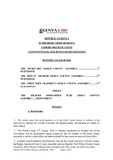THE EFFECT OF INTERNET ADVERTISING ON ATTITUDE TOWARDS INTERNET ADVERTISING OF UNIVERSITY STUDENTS IN KENYA

View/
Date
2014-11Author
Peter, Ogutu Robert
Martin, Professor Ogutu
Lilly, Professor Njanja
Metadata
Show full item recordAbstract
The internet is fast emerging as an important advertising medium in Kenya. The enhanced ICT
infrastructure in Kenya resulting in improved and faster internet connection along with a drop in
prices for internet services has not only raised the volume of internet users, but also prompted
interest in the growth of businesses on the internet with estimates projecting spending on internet
advertising to increase. However, despite this unprecedented growth, minimal empirical
research has been undertaken to explore the effect of internet advertising on attitude towards
internet advertising in Kenya with many studies having been conducted in other contexts other
than Kenya’s. This study therefore sought to determine the effect of internet advertising on
attitude towards internet advertising in Kenya. A cross sectional survey research design was
adopted with university students as the target population. A pre – test on the survey instrument
was conducted to check on the format and suitability of questions with Cronbach’s alpha statistic
used as the measure of reliability. A multiple linear regression analysis was used to test for
causal relationships among the variables. Results of the unified model that included both male
and female students, found interactivity, credibility, entertainment and irritation to be the key
determinants of attitudes towards internet advertising. Whereas interactivity, credibility,
entertainment had a significantly positive effect, irritation had a negative effect. While
interactivity had the greatest impact, informativeness wasn’t a significant predictor. However,
considered separately, differences emerged on factors influencing attitude formation towards
internet advertising. Interactivity and infomativeness were the main predictors for males and
both impacted positively with interactivity having the greatest impact while females had
interactivity, entertainment, credibility and irritation as the main predictors with interactivity
having the greatest impact. Interactivity, entertainment and credibility impacted positively while
irritation had a negative effect
Collections
- Publications 2019 [91]
